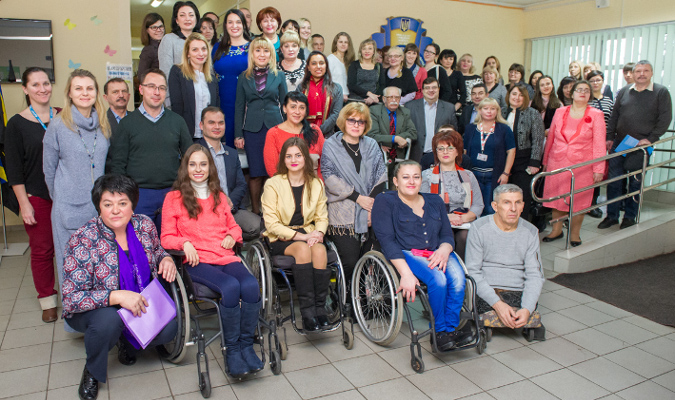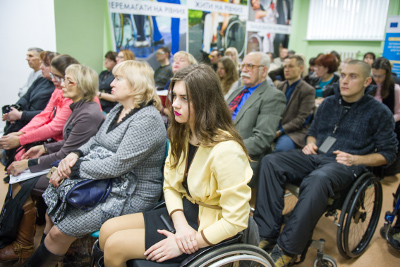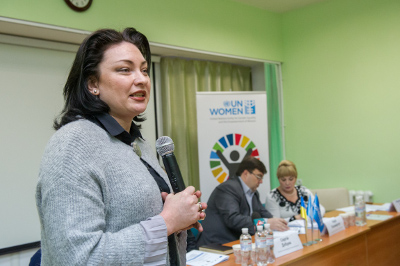Women with disabilities are unable to access public services in eastern Ukraine, finds UN Women’s Gender Audit
While women with disabilities are mostly excluded from the local planning and decision making, when empowered they can become active agents of change in their cities and communities, concludes a Gender Audit conducted by UN Women in eastern Ukraine.Date:

In December 2017, UN Women organized "Leaving No One Behind: The Rights of Women with Disabilities Forum" in Kramatorsk, in eastern Ukraine, to present the results of the ‘Gender Audit of the Accessibility of Services,’ conducted in collaboration with the National Assembly of Persons with Disabilities of Ukraine and the Kramatorsk City Council. The findings revealed that inaccessibility of services, especially those provided by public institutions, causes direct and indirect discrimination, social isolation and marginalization in eastern Ukraine.
Conducted by a team of women and men with disabilities, with the support of UN Women and Kramatorsk City Council, the gender audit focused on the accessibility of social protection, healthcare and education services, provided by eight public institutions in Kramatorsk city of Donetsk oblast.

The results confirmed that all eight audited buildings did not comply with the international standards and the accessibility requirements of the national legislation. Findings revealed no safe and accessible transportation available in the city for women and men with physical disabilities to travel and access healthcare, social and educational facilities independently. The audited buildings lack ramps at the entrance, healthcare facilities lack specific equipment to examine women with physical disabilities, such as X-Ray and mammographs, gynecological examination beds, among others. None of the medical personnel of the audited facilities has been trained to provide non-discriminatory equal treatment to women with disabilities or provide special assistance during examination or treatment.
“What is an accessibility audit? It is an audit of how we treat people with disabilities. It is a step towards democracy and towards realization of each individual’s full potential,” said Lilia Kislitsyna, a member of the Kramatorsk City Council.
In Ukraine, women and girls with disabilities are among those vulnerable groups, who face multiple and intersecting forms of discrimination. Their rights to education, healthcare, social protection, access to information are not fully realized because of many barriers. For some of the women and girls with disabilities, these barriers begin with inaccessibility to preschool education. For some of them, inaccessibility of healthcare and reproductive health services, inhibits their ability to plan a family and give birth. Combined with widespread discrimination, stereotyping and stigma, the inaccessibility of services contributes to their increased risk to violence, poverty and social exclusion.

Anastasia Divinskaya, UN Women Country Programme Manager/Head of Office in Ukraine highlighted that women hold a key role in ensuring that their various needs and priorities are met. “The audit identified information and communication problems as well as architectural and infrastructural barriers that restrict women with disabilities from accessing public services, which lead to their social isolation, alienation and exclusion. Our role is to support their leadership and we will continue to do so,” she said.
The recommendations of the gender audit on accessibility provide valuable evidence for women and men with disabilities to advocate for inclusion of their needs for accessible services and architecture in local programs and budget. Public authorities and civil society organizations discussed integrating the Gender Accessibility Audit findings and recommendations in 2018 local programs and budgets and assign the respective units in the City Council with the responsibility for timely implementation. Some of the recommendations include conducting trainings on non-discrimination, accessibility and inclusive policy on disability for public servants; purchasing accessible buses and specific equipment required for health services, such as gynecological services, for women with disabilities in five audited healthcare facilities.
The activity was carried out within the Joint UNDP-UN Women Programme “Restoration of Governance and Reconciliation in Crisis-Affected Areas of Ukraine,” funded by the European Union.